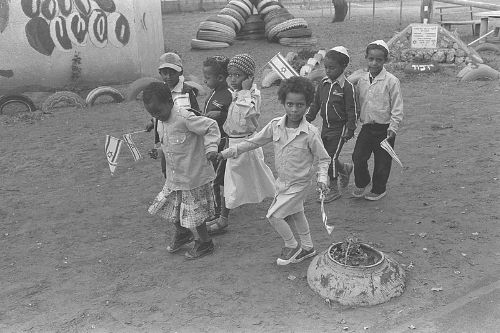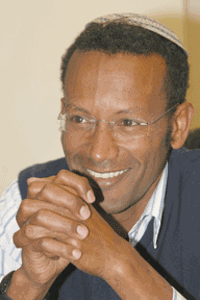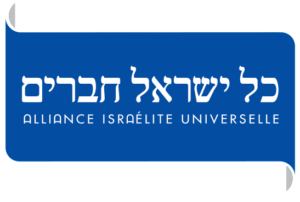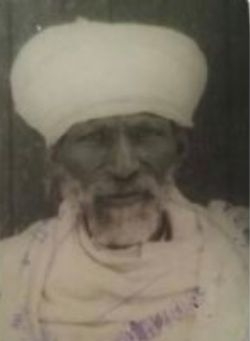Ethiopian Jewry & the Rich Diversity of Jewish Life: An Interview with Rabbi Dr. Sharon Shalom

Mazal tov on the founding of the Center for the Study of Ethiopian Jewry at the Ono Academic College!

The Monthly Sage ◊ Feature Photo ◊ Upcoming Events ◊ Donate ◊ Archive
Sephardi Ideas Monthly is a continuing series of essays from the rich, multi-dimensional world of Sephardi thought that is traditionally delivered to your inbox on the second Monday of every month. We delayed this month’s SIM in order to bring you an exclusive interview with Rabbi Dr. Sharon Shalom, who will be speaking at the upcoming Jewish Africa Conference (27-29 January) organized by the American Sephardi Federation and Association Mimouna.
Rabbi Dr. Sharon Shalom

(Photo courtesy of Brandeis University)
Born and raised in Ethiopia until the age of nine, Rabbi Dr. Sharon Shalom trekked with his family to Sudan before being spirited out to Israel in 1982. Once in the country, R’ Shalom not only learned the language and acclimated to Israeli society, he served as an officer in the Israel Defense Forces, received ordination from the Israeli Rabbinate, and earned a PhD at Bar Ilan University.
In 2012, R’ Shalom penned his first book, a pioneering study of Ethiopian Jewish tradition, From Sinai to Ethiopia: The Halakhic and Conceptual World of Ethiopian Jewry. The book has been translated into English by Gefen Publishing House. His follow-up book, Conversation about Love and Fear: The Dialogue between the Rabbi’s Daughter and the Kes’s Son (Hebrew), is a thought-provoking and courageous work that contends with some of the deeper issues bedeviling Israeli religious society. It was published at the end of 2018. To top it all off, earlier this month R’ Shalom was installed as head of the International Center for the Study of Ethiopian Jewry at the Ono Academic College.
R’ Shalom graciously agreed to sit down with SIM for a cup of coffee and an interview about the relationship between Ethiopian Jewry and R’ Ovadia Yosef, academic studies of Ethiopian Jewish culture, his new book, the new center at Ono College, and the problem with well-intentioned but ultimately limited liberal and pluralistic approaches to the study of Ethiopian Jewish tradition.
~~~~~~~


Wobshat Ayetgav, from the province of Gondar in northern Ethiopia, worked as a farmer but studied Torah at night and on Shabbat. That didn’t satisfy Wobshat’s desire for Judaism, however, so he left his family for a period of seven years in order to study and be ordained as a Kess by Ethiopian Jewish priests. After being installed as a Kess, he returned to his family and to his agricultural work.
Tension with local Christians, however, compelled Kess Ayetgav to move to the Jewish village of Ambobar. Once there, Kess Ayetgav established and led a synagogue and children’s school. He then left Ambobar in 1973 to make aliyah to Israel. Upon arriving in the country, Kess Ayetgav met with Hacham Ovadia Yosef, who soon ruled that Ethiopian Jews are, indeed, fully Jewish.
Kess Wobasht Ayetgav lived in Israel for 21 more years, serving the Ethiopian Jew community in the country and helping to establish the Israeli version of the Ethiopian Jewish Sigd festival. Kess Ayetgav passed away in 1994. Since he didn’t leave behind any writings, his teachings have been collected by his children and pupils.
Kess Wobshat Ayetgav on Charity:
“Let your home be wide open”– Every person must open his home and heart to all who approach him. We must see to food for those who request food, we must see to lodgings for those who require lodgings. And we must provide support to those who request it. We must excel in the attribute of compassion. It is appropriate that a person open his heart and home to all those who are needy and willing, see to it that your home is always open to all people, to provide a place to sleep and foodstuffs to those who request them. It is forbidden for a person to take money from people requesting a blessing or sound advice, and if one is nevertheless given money, he should give the money as a donation to charity so that it be distributed to the needy.
Feature Photo:

(Photo courtesy of Government Press Office of Israel/Wikimedia Commons)
Upcoming Events:
The American Sephardi Federation and Association Mimouna present: Jewish Africa Conference – Past, Present, and Future Sunday, 27 January-Tuesday, 29 January Center for Jewish History 15 West 16th Street New York City Please register here or call: 1.800.838.3006 Join The American Sephardi Federation and جمعية ميمونة Association Mimouna to explore the past, present, and future of Jewish Africa. Sunday, 27 January, 6:30PM Opening Cultural Evening Starring the Grammy-nominated and ASF Pomegranate Award-winning Innov Gnawa Featuring special exhibitions of Sub-Saharan African Synagogues: Architecture & Context by Jay Waronker, and photographs of Jewish Africa by Jono David/HaChayim HaYehudim Jewish Photo Library Traditional Jewish Ethiopian food (Kosher) will be co-presented by Chassida Shmella: Ethiopian Jewish Community of North America Monday, 28 January, 9:00AM Tuesday, 29 January, 9:00AM Representatives from across Africa (including Ethiopia, Egypt, Morocco, Nigeria, South Africa, Uganda, Zimbabwe, and other countries) will present on panels exploring the history, culture, and contemporary life of Jewish people and sites in Sub-Saharan and North Africa. There will also be a strategic planning lunch to foster communication and cooperation between Jewish African communities. Participants include (but are not limited to): Rabbi Shlomo Bentolila (Chabad-Lubavitch of Central Africa), Dr. Aomar Boum (“Jews of Timbuktu”), Dr. Marla Brettschneider (The Jewish Phenomenon in Sub-Saharan Africa), President Magda Haroun (Egyptian Jewish Community), Vice President Samy Ibrahim (Drop of Milk Association), Dr. Ephraim Isaac (From Abraham to Obama: A History of Jews, Africans, and African Americans), Abere Endeshaw Kerehu (Jewish Community in Ethiopia), Dr. André Levy (Return to Casablanca: Jews, Muslims, and an Israeli Anthropologist), Dr. Yoram Meital (“Synagogues and Jewish Heritage in Modern Egypt: Re-configuring Past and Present”), Director Tali Nates (Johannesburg Holocaust & Genocide Centre), Houda Ougaddoum (Association Mimouna), Dr. Tudor Parfitt (“The Jews of Sub-Saharan Africa: Myth and Reality”), Ilona Remy (“The Place of the Igbo in the Israelite World”), Diplomatic & Parliamentary Liaison Chaya Singer (South African Jewish Board of Deputies), and Dr. Shalva Weil (“The Beta Israel of Ethiopia until 1991: Identity, History, and Unique Customs”) The Jewish Africa Conference is made possible by a generous grant from OCP Jewish Africa Film Festival As part of the Jewish Africa Conference – Past, Present, and Future, Kulanu is sponsoring a two-night, four film festival exploring Jewish life in Ghana, Madagascar, Nigeria, and Uganda. Each evening will feature either the director or a participant from the films as a presenter as well as post-film Q&As. Monday, 28 January, at 7:00 PM Gabrielle Zilkha’s Doing Jewish: A Story from Ghana (2016) David Vinik and Debra Gonshor Vinik’s Yearning to Belong (2007) Tuesday, 29 January, at 7:00 PM Joshua Kristal’s Journey to Judaism: the Story of Madagascar (2016) Jeff Lieberman’s Re-Emerging: The Jews of Nigeria (2012) Conference Badge or VIP Conference Badge holders can attend the entire Jewish Africa Conference (including the Opening Cultural Evening) and the Jewish Africa Film Festival. Tickets to specific events are also available. |
 The Changing Arab Military Threat to Israel The Algemeiner Editor’s Club and the American Sephardi Federation The Algemeiner’s Editors Club and the ASF will host Kenneth Pollack, a former CIA Analyst, AEI Resident Scholar, and author of the new book, Armies of Sand: The Past, Present, and Future of Arab Military Effectiveness (Oxford University Press, 2018), in conversation with Algemeiner Editor-in-Chief Dovid Efune Wednesday, 30 January, at 7:15 PM A conversation and book signing with Kenneth Pollack Center for Jewish History 15 West 16th Street New York City Please register here General admission: $15 VIP ticket: $75 Complimentary for Algemeiner members VIP entrance includes a signed copy of the book and VIP reception at 6:30PM For further information, please email: batsheva@theaj.com or call: 212-376-4988 ext 101. |
 The American Sephardi Federation, Sephardic Jewish Brotherhood of America, Binghamton University Department of Judaic Studies, & American Jewish Historical Society present: The American Sephardi Federation, Sephardic Jewish Brotherhood of America, Binghamton University Department of Judaic Studies, & American Jewish Historical Society present:International Ladino Day: A Celebration of Words and Music A Festival to celebrate Ladino, the remarkable language also known as Judeo-Spanish Sunday, 10 February, 2:00-5:00PM Center for Jewish History 15 West 16th Street New York City Please register here or call: 1.800.838.3006 Light refreshments will be served. Celebrate Ladino in the company of highly acclaimed musicians and writers. Hear clarinetist Danny Elias; author Jane Mushabac‘s story, Seven Songs; composer Avi Amon’s musical fantasy, Salonika; scholar Bryan Kirschen speaking on Ladino’s rich culture; Rabbi Nissim Elnecavé on wisdom tales; and the Alhambra Ensemble’s Songs of Courtship, Love, and Holidays with oud, violin, shawm, dumbek and voices. Since 2013, when Israel’s 5th President Yitzhak Navon endorsed Zelda Ovadia’s idea of International Ladino Day, celebrations have been held in Jerusalem, Seattle, Istanbul, Madrid, Dallas, Forest Hills, Boston, and other cities. February 10th marks the Second Annual International Ladino Day at the Center for Jewish History. Ladino is a bridge to many cultures; it’s a Spanish language that includes words in Hebrew, Turkish, Arabic, and more. The mother tongue of Jews in the Ottoman Empire for 500 years, Ladino was the home language of Sephardim worldwide in the early 20th century. Although today Ladino is only spoken by a small fraction of Sephardim, the interest in the language and its culture is experiencing a resurgence through distinguished university programs, publications, concerts, and events of many kinds. The February 10th event is presented by the American Sephardi Federation, the American Jewish Historical Society, the Sephardic Jewish Brotherhood of America, and Binghamton University Department of Judaic Studies and the Charles and Rae Grabel Memorial Fund for Judaic Studies. We are also grateful to the New York State Council on the Arts with the support of Governor Andrew M. Cuomo and the New York State Legislature. |
 The Center for Jewish History and The American Sephardi Federation present: The Center for Jewish History and The American Sephardi Federation present:Family History Today: Genealogy Lecture for Greater Sephardi Families Thursday, 21 February, at 6:30PM Center for Jewish History 15 West 16th Street New York City Please register here Admission is complimentary! Curious about family history outside of the Pale of Settlement? The Center for Jewish History welcomes you to a lecture on genealogy tools for those interested in researching Jewish community records and Jewish life in the Greater Sephardic Diaspora. Open to all. No previous experience or preparation is necessary. Presented by J.D. Arden, Genealogy and Reference Librarian at the Center for Jewish History and adjunct faculty at the LIU-Palmer School of Library & Information Science. An ASL interpreter may be made available if requested in advance. Presented by The Ackman & Ziff Family Genealogy Institute at The Center for Jewish History and The American Sephardi Federation. |
 The Center for Jewish History, The American Sephardi Federation, The American Jewish Historical Society, and Jewish Book Council present: The Center for Jewish History, The American Sephardi Federation, The American Jewish Historical Society, and Jewish Book Council present:First Person: Matti Friedman in Conversation w/ Lucette Lagnado Thursday, 12 March, at 7:00PM Center for Jewish History 15 West 16th Street New York City Matti Friedman’s new book, Spies of No Country: Secret Lives at the Birth of Israel tells the unknown story of four of Israel’s first Sephardi spies. Recruited by a rag-tag outfit called the Arab Section before the 1948 War of Independence, they assumed Arab identities to gather intelligence and carry out sabotage and assassinations. At the height of the war the spies posed as refugees fleeing the fighting, reached Beirut, and set up what became Israel’s first foreign intelligence station. Spies of No Country not only tells a breathtaking and true espionage story, it also explores a different story about how the state was founded and raises many questions that are relevant today. In a wide-ranging, First Person conversation, Matti Friedman speaks with the Cairo-born, awarding-winning Sephardi author Lucette Lagnado (The Man in the White Sharkskin Suit) about his journalism career in the Middle East and what Spies of No Country reveals about Israel in the 20th and 21st centuries. Please register here Ticket Info: $15 general; $12 seniors, $10 members and students |
 Nosotros: Strengthening Bonds Between Jewish and Latino Communities The Second Edition Thursday, 11 October, at 7:30PM Center for Jewish History 15 West 16th Street New York City Admission is complimentary! The Philos Project and American Sephardi Federation cordially invite you to “Nosotros,” an exhibition composed of pieces by Latino artists celebrating the shared history and culture of Jewish and Latino communities, and expressing hope for a more positive future. Latin American artistry is rich with Sephardi and Crypto-Jewish allusions and symbols. The exhibit is titled “Nosotros,” the Spanish word for “us,” and all of the art represents the growing relationship between the Jewish and Hispanic communities in New York and around the world. The exhibit is one of the many things Jesse Rojo, The Philos Project’s Hispanic Affairs Director, is doing to bridge the gap between Hispanics and the Middle East. Rachael Reynolds, a graduate from our 2018 Philos Leadership Institute (PLI) cohort, is one of the featured artists. She will be showcasing portraits she took on PLI that compare the lives of Christians living freely in Israel to the lives of Christian refugees in Jordan. Through her project, Rachael is not only advocating for the protection of Christians in Arab states, but also elevating Israel as the model for state protection of religious freedom in the Middle East. We look forward to seeing you! |
| Donate now and your tax-deductible contribution will help ASF preserve and promote Greater Sephardi history, traditions, and culture as an integral part of the Jewish experience! Contact us by email to learn about giving opportunities in honor or memory of loved ones. |